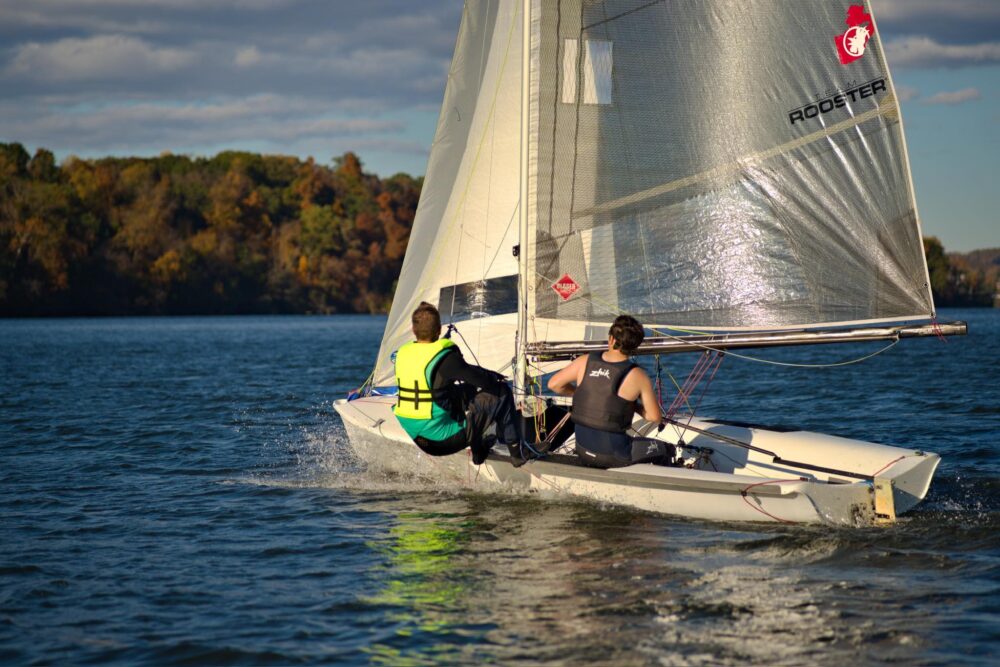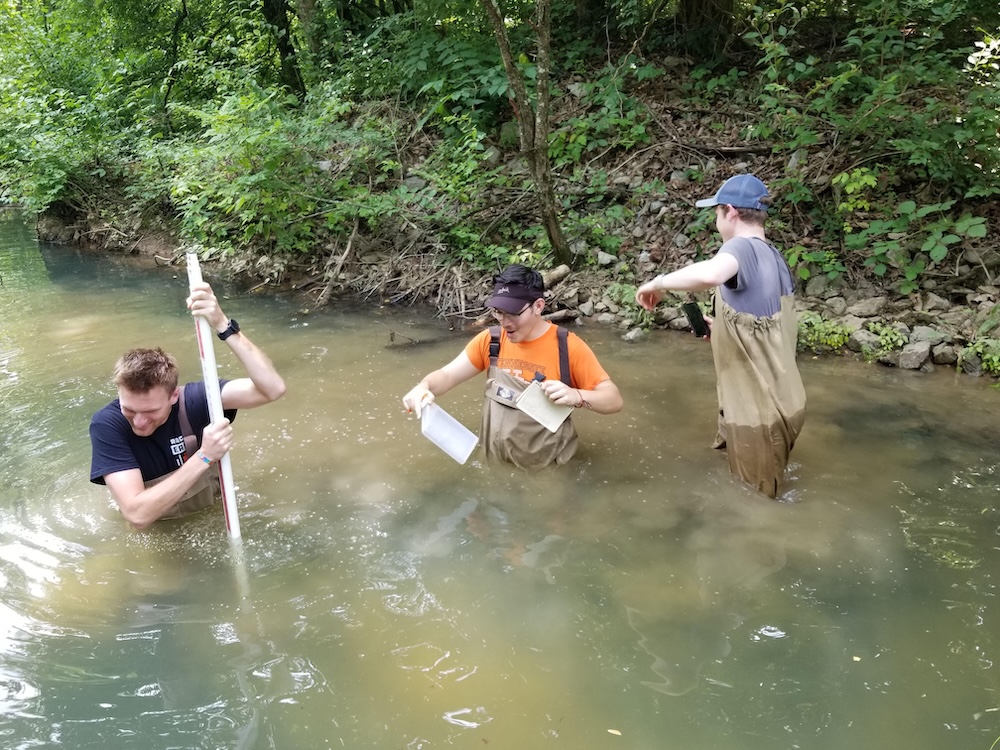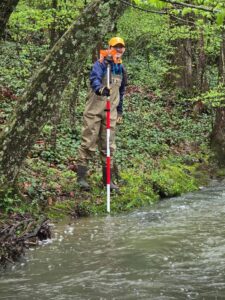The Commodore in a Lab Coat
Tucker Martin loves the water.
The civil and environmental engineering (CEE) senior joined the Sailing Club at the University of Tennessee (SCUT) during his first semester at UT. Just months later, he became the race team captain and the club’s commodore (president).
“Obviously, my classes come before sailing, but I’m out as often as is reasonable,” Martin said.
When it’s cold, Martin sails in a wetsuit. When it rains, he helps maintain the team’s boats. Martin has put his sweat and blood into sailing—sometimes literally, as in his first race with SCUT.

“We were competing in North Carolina, and I didn’t have gloves for sailing yet,” he recalled. “The high winds really tested my grip and tore my hands to shreds. I had so much fun!”
That level of commitment also extends to his research, which Martin also started during his first term in the lab of CEE Professor John Schwartz. Over the last four years, Martin has made important contributions to rating and improving waterway quality throughout the state.
“Tucker is really engaged and really organized. He’s a phenomenal student,” Schwartz said. “He’ll be a leader moving forward.”
Boaters Make Great Environmental Researchers
At the end of high school, Martin was interested in environmental science, but unsure whether he should pursue it as a career.
Then, he learned about the Delta Works projects, a complex network of flood prediction and storm protection infrastructure in the Netherlands.
“It pushed every other thing I was thinking about out of the water,” Martin recalled (pun very much intended). “I said, ‘I want to do something like that. I want to protect entire groups of people at once from disasters like flooding and hurricanes.’”

Martin enrolled in TCE as a member of the Joseph C. and Judith E. Cook Grand Challenge Honors Program, which gave him the opportunity to start conducting research immediately. Intrigued by Schwartz’s research on water quality and watershed science, Martin asked to join his lab.
Schwartz, who is also the director of the Tennessee Water Resources Research Center (TNWRRC), has found that the best environmental researchers have a personal connection to the topic; several of his most successful graduate students have been kayakers. Upon learning that Martin was already a member of SCUT, Schwartz knew he would fit right in.
Martin joined Schwartz’s lab in September of his first year, helping track water quality and acid rain pollutants in waterways of the Great Smoky Mountains.
“I just wanted to start doing water research ASAP,” Martin recalled. “That was a fantastic decision on my part. I’ve made great connections and had great opportunities.”
How to Grade Streams Fairly
After two years taking environmental samples for the TNWRRC, Martin decided to conduct research a bit closer to his interest in flood control.
He joined the Urban Waters Report Card (UWRC) project, which Schwartz had initiated in 2022. The UWRC is an effort to monitor water health and improvements across the state of Tennessee, with particular focus on cities with stormwater management programs.
“The UWRC is a holistic measure that lets you track stream health year-to-year in many different categories, like the amount of silt in the water and how fast the water rises when it rains,” Martin explained.
 As the team developed the tool, Martin realized that it needed a way to control the scores for local geomorphology, or the type of native material under a waterway.
As the team developed the tool, Martin realized that it needed a way to control the scores for local geomorphology, or the type of native material under a waterway.
“We have at least six ecoregions in Tennessee,” he said. “We have mountains and a large river on opposite ends of the state. Is it fair to use the same metrics to assess stream health in both places?”
For example, one common measure of water quality is the amount of particle matter or silt in the water. By that metric, a stream in Nashville, where the stream bed is made of solid rock, will automatically be ‘cleaner’ than a stream in Memphis, where pieces of sandy soil are more likely to get swept up.
Instead of comparing all the state’s streams to one reference (target) stream, Martin sampled reference streams in each of Tennessee’s ecoregions. Going forward, the team will score each waterway based on the reference stream that has the most similar stream geomorphology.
The results of the UWRC will go up on a public-facing website this summer, helping Tennesseans understand the health of their communities’ waterways and how it can be improved.
Bringing Coastal Techniques Inland
As he investigated the factors that affect stream quality across the state, Martin also heavily prioritized his free time on the water.
“Sailing in Knoxville is a ‘When you can and the weather permits, go!’ kind of activity,” he said. “I consider myself a weekend warrior for sailing, so I got most of my research, internships, and schoolwork done during the week.”
While that schedule worked for most of his time at UT, when Martin was serving as SCUT’s commodore, things got a bit choppy.
“In my peak activity with SCUT, we had two four-hour practices per week, so my remaining schoolwork often got pushed to Saturday, and I still went racing on Sunday,” he recalled.
Despite those difficulties, Martin never got swamped enough to consider giving up either engineering or sailing. In fact, he plans to continue sailing while pursuing his master’s degree in coastal engineering at the University of Delaware.
In addition to enjoying the more favorable sailing weather in the northeast, he looks forward to learning firsthand how flood control is handled on the coast—and then bringing those techniques back to Rocky Top.
“Last year in Hurricane Helene, we had inland areas that should never have gotten hit that were suddenly dealing with flooding,” he said. “In some places, we saw a large loss of life and immense loss of property. I want to see if we can modify coastal strategies to use them in an inland setting. That kind of engineering could help millions of people.”
Contact
Izzie Gall (865-974-7203, egall4@utk.edu)